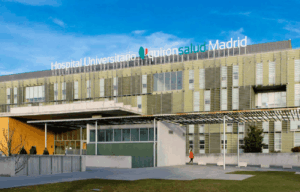Hepatitis C
Disease description
Hepatitis C is an inflammatory liver disease caused by the hepatitis C virus. Progressing over the years, the disease causes irreversible damage to liver cells and leads to severe complications, including hepatocellular carcinoma (cancer).
There are two forms of the disease:
● acute: lasts up to six months
● chronic: the disease persists for many years
According to statistical data from the World Health Organization, up to 85% of acute hepatitis C cases progress to the chronic form.
Symptoms that indicate the need for diagnosis and treatment
During the first six months, the disease may not present any symptoms. Initial signs of liver damage can be mild and nonspecific:
- emotional instability and irritability
- nausea and decreased appetite
- discomfort and heaviness in the right upper quadrant
- joint pain
- yellowing of the eyes and skin
- “dark beer” colored urine and acholic (unpigmented, pale) stool
- weight loss
Diagnosis and treatment methods
Diagnosis
Hepatologists and gastroenterologists in leading clinics follow an established protocol for effective diagnosis of hepatitis C:
- blood tests (complete blood count, biochemistry, PCR, ELISA, alpha-fetoprotein — an inflammation tumor marker)
- liver ultrasound (to assess the size and structure of the organ)
- esophagogastroduodenoscopy (EGD): signs of hepatitis C include esophageal varices
- FibroScan (elastometry): to assess the degree of liver fibrosis (scarring)
Treatment
The cornerstone of hepatitis C treatment is antiviral therapy. Modern direct-acting antiviral drugs, prescribed in leading medical centers worldwide, cure hepatitis C in 95% of cases.
Comprehensive treatment includes hepatoprotectors to protect liver cells and intravenous infusions to alleviate toxic damage.
Innovations in global clinics
To treat the most common type of hepatitis C (genotype 1), the world’s top gastroenterology clinics use interferon-free DAA therapy, which enhances the action of T-cells in fighting the virus and supports the immune system.
Top clinics
-
 Istanbul, Turkey Acibadem Altunizade
Istanbul, Turkey Acibadem Altunizade -
 Seoul, South Korea Asan Medical Center
Seoul, South Korea Asan Medical Center -
 Jerusalem, Israel Hadassah Medical Center
Jerusalem, Israel Hadassah Medical Center -
 Petah Tikva, Israel Medical Center “Rabin”
Petah Tikva, Israel Medical Center “Rabin” -
 Istanbul, Turkey Medipol Mega University Hospital
Istanbul, Turkey Medipol Mega University Hospital -
 Geneva, Switzerland Hirslanden Clinique La Colline
Geneva, Switzerland Hirslanden Clinique La Colline -
 Geneva, Switzerland Generale-Beaulieu
Geneva, Switzerland Generale-Beaulieu -
 Istanbul, Turkey Medistate International Hospital
Istanbul, Turkey Medistate International Hospital -
 Antalya, Turkey Hospital Medical Park Antalya
Antalya, Turkey Hospital Medical Park Antalya -
 Dubai, UAE NMC Healthcare
Dubai, UAE NMC Healthcare -
 Istanbul, Turkey Hospital “Memorial Şişli”
Istanbul, Turkey Hospital “Memorial Şişli” -
 Abu Dhabi, UAE Burjeel Hospital Abu Dhabi
Abu Dhabi, UAE Burjeel Hospital Abu Dhabi -
 Vienna, Austria Debling Private Clinic
Vienna, Austria Debling Private Clinic -
 Vienna, Austria Confraternität Private Hospital
Vienna, Austria Confraternität Private Hospital -
 Winterthur, Switzerland Clinic "Lindberg"
Winterthur, Switzerland Clinic "Lindberg" -
 Incheon, South Korea Gil Medical Center at Gachon University
Incheon, South Korea Gil Medical Center at Gachon University -
 Nyon, Switzerland Clinique Genolier
Nyon, Switzerland Clinique Genolier -
 Istanbul, Turkey “Memorial Ataşehir” Clinic
Istanbul, Turkey “Memorial Ataşehir” Clinic -
 Barcelona, Spain QuironSalud Barcelona Hospital
Barcelona, Spain QuironSalud Barcelona Hospital -
 Barcelona, Spain Dexeus University Hospital
Barcelona, Spain Dexeus University Hospital -
 Barcelona, Spain Medical Center "Teknon"
Barcelona, Spain Medical Center "Teknon" -
 Barcelona, Spain University Hospital Barnaclinic+
Barcelona, Spain University Hospital Barnaclinic+ -
 Madrid, Spain University Clinic HM Madrid
Madrid, Spain University Clinic HM Madrid -
 Madrid, Spain University Hospital HM Monteprincipe
Madrid, Spain University Hospital HM Monteprincipe -
 Gebze, Turkey Anadolu Clinic
Gebze, Turkey Anadolu Clinic -
 Zurich, Switzerland Hirslanden Clinic
Zurich, Switzerland Hirslanden Clinic -
 Madrid, Spain Quiron Salud University Hospital
Madrid, Spain Quiron Salud University Hospital -
 Seoul, South Korea Samsung Medical Center
Seoul, South Korea Samsung Medical Center -
 Seoul, South Korea Medical Center at Ewha Womans University
Seoul, South Korea Medical Center at Ewha Womans University -
 Seoul, South Korea SNUH
Seoul, South Korea SNUH





























